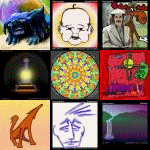Digital Culture
Taking the notion of online collaboration to a whole new level, VinylMint has created a cloud-based solution for musicians to jam and record in real time.
No way in hell would i ever use a cloud account, might as well start a blog and put all your personal info on it, pretty much the same thing.
Once the winning candy bar wrapper is opened, the tracking device will go off and Nestle officials will be able to find the exact location of the customer. [What could go wrong?]
On your phone or tablet… move your phone around in space… It’s like augmented reality, except it’s even more augmented because your phone is showing you things that aren’t there… phone becomes a moving window to the place and time in which the panorama was created… 360-degree panorama tool… when we played with these in the newsroom at VentureBeat we were soon moving our phones through the air like complete idiots … and enjoying every second of it.
Jelly Bean’s camera app has also been updating to allow for easier browsing of photos. The interface looks smoother and simpler than the Ice Cream Sandwich camera.
When the Spanish, online voting company SKYTL bought the largest vote processing corporation in the United States, it also acquired the means of manufacturing the outcome of the 2012 election. For SOE, the Tampa based corporation purchased by SKYTL in January supplies the election software which records, counts and reports the votes of Americans in 26 states–900 total jurisdictions–across the nation.
As the largest election results reporting company in the US, SOE provides reports right down to the precinct level. But before going anywhere else, those election returns are routed to individual, company servers where the people who run them “…get ‘first look’ at results and the ability to immediately and privately examine vote details throughout the USA.” In short, “this redirects results …to a centralized privately held server which is not just for Ohio, but national; not just USA-based, but global.”
And although the votes will be cast in hometown, American precincts on election day, with the Barcelona-based SKYTL taking charge of the process, they will be routed and counted overseas.
SKYTL itself is a leader in internet voting technology and in 2010 was involved in modernizing election systems for the midterm election in 14 American states.
But although SKYTL’s self-proclaimed reputation for security had won the company the Congressionally approved task of handling internet voting for American citizens and members of the military overseas, upon opening the system for use in the District of Columbia, the University of Michigan fight song “The Victors” was suddenly heard after the casting of each ballot. The system had been hacked by U of M computer teachers and students in response to a challenge by SKYTL that anyone who wished to do so, might try!
Nevertheless, in spite of warnings by experts across the nation, American soldiers overseas will once again vote via the internet in 2012. And because SKYTL will control the method of voting and—thanks to the purchase of SOE–the method of counting the votes as well, there “…will be no ballots, no physical evidence, no way for the public to authenticate who actually cast the votes…or the count.”
The American advocacy group Project Vote has concluded that SKYTL’s internet voting system is vulnerable to attack from the outside AND the inside, a situation which could result in “…an election that does not accurately reflect the will of the voters…” Talk about having a flair for understatement!
It has also been claimed that SKYTL CEO Pere Valles is a socialist who donated heavily to the 2008 Obama campaign and lived in Chicago during Obama’s time as Illinois State Senator. Unfortunately, given what is known about the character of Barack Obama, such rumors must be taken as serious threats to the integrity of the 2012 vote and the legitimate outcome of the election.
Though much has been written about the threat of nationwide voting by illegals in November, it is still true that most election fraud is an “inside” job. And there now exists a purely electronic voting service which uses no physical ballots to which an electronic count can be matched should questions arise. Add to this the fact that the same company will have “first count” on all votes made in 14 US states and hundreds of jurisdictions in 12 others and the stage is set for election fraud on a scale unimaginable just a decade ago.
Perhaps Obama had reason for supreme confidence when he said “After my election” rather than “in case of” to Russian President Medvedev a week ago. ...
wear the Internet on your face? ... Google Glasses, now in an early prototype phase [video] ... also slightly scary for anyone concerned about the prying eyes of government surveillance.
[Brings to mind this video about CIA and the Internet]
True confession: I was once among the late adopters. I freely put down the techno enthusiasts. I wrote a highly negative review to Virginia Postrel’s provocative book The Future and Its Enemies, which turns out to have seen what I did not see. After the digital revolution advanced more and more, I began to notice something. By being a late adopter, I gained no advantage whatsoever. All it meant was that I paid a high price in the form of foregone opportunities. If something is highly useful tomorrow, chances are that it is highly useful today, too. It took me a long time to learn this lesson.
The Second Circuit Court of Appeal has handed down a big decision in Viacom's $1 billion lawsuit against YouTube. The appellate circuit rules Thursday that while the district court judge correctly interpreted the safe harbor provisions of the Digital Millennium Copyright Act, which YouTube parent company Google said shielded it from Viacom's copyright claims, the judge shouldn't have dismissed the case on summary judgment. The appellate circuit judges ruled that a reasonable jury could conclude that YouTube had knowledge or awareness of infringing clips on its system. As such, the case has been remanded back to the trial court.
Real Programmers write in Fortran.
Maybe they do now, in this decadent era of Lite beer, hand calculators and "user-friendly" software but back in the Good Old Days, when the term "software" sounded funny and Real Computers were made out of drums and vacuum tubes, Real Programmers wrote in machine code. Not Fortran. Not RATFOR. Not, even, assembly language. Machine Code. Raw, unadorned, inscrutable hexadecimal numbers. Directly.
Lest a whole new generation of programmers grow up in ignorance of this glorious past, I feel duty-bound to describe, as best I can through the generation gap, how a Real Programmer wrote code. I'll call him Mel, because that was his name. ...
I had been hired to write a Fortran compiler for this new marvel and Mel was my guide to its wonders. Mel didn't approve of compilers.
"If a program can't rewrite its own code," he asked, "what good is it?" [emphasis added — I loved Mel from this sentence!]
As of around October 2011 – the date varies by category – iTunes has sold over 16 billion songs, about one half-billion movies, videos and teevee shows, some 20 billion apps, and Crom knows how many books, magazines and newspapers.
Here’s the rub: in each and every one of these approximately 40,000,000,000 cases, the purchaser could have downloaded the damn thing for free. In most cases, it is far easier to illegally cop a boot than it is to purchase one. Let’s start with the fact that you don’t need to have a credit card or room left on your credit limit to procure your illegal bootie.
So. 40 billion downloads from just one – the biggest one – online merchant in a world that only houses seven billion people. That’s an average of four and one-half perfectly legal downloads for each and every person, including babies in the Amazon who don’t even have access to Amazon.
Hey! People are inherently good. Go know!

